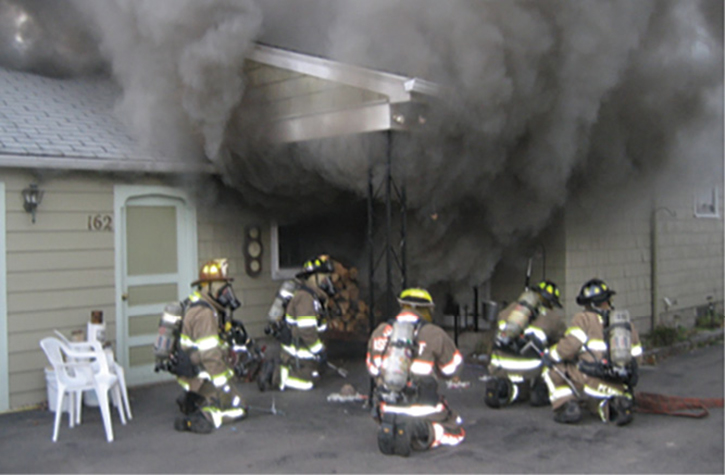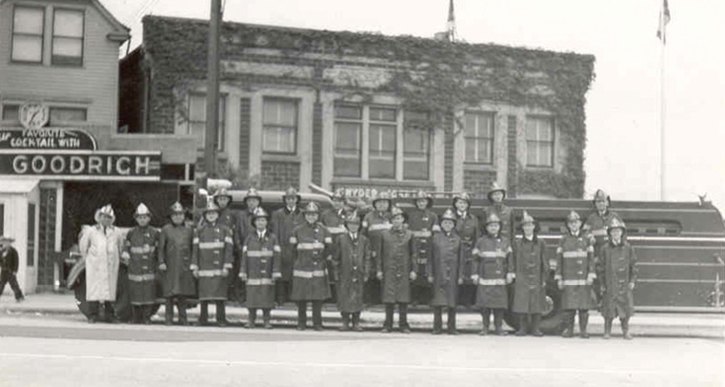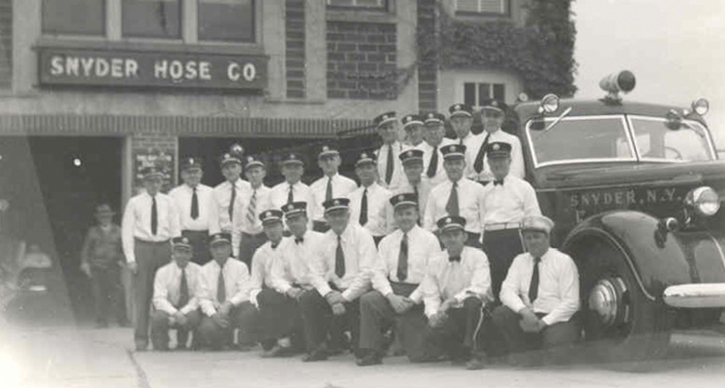
VOLUNTEERS CORNER ❘ By Thomas A. Merrill
Delivering exceptional service is the trademark of a professional firefighter. If a firefighter happens to be a volunteer, he can still act professionally and deliver professional service. Professionalism is not defined by a paycheck. Even if some definitions do include earning a living or receiving pay, let’s worry about what we do have control over. Let’s work as hard as we can to uphold all the other attributes that define and showcase professionalism.
It’s so ironic that one common complaint volunteer firefighters have is that they are not given the respect they think they deserve, but there is no shortage of incidents depicting volunteer departments and firefighters performing in a manner that damages the reputation of the volunteer fire service. Now, most certainly, some of the challenges volunteer departments face that directly impact their professional reputation are completely out of their control. Limited staffing because of community indifference might result in a very poor turnout to a serious incident. Outdated equipment because of community budget issues might also impact on-scene performance. However, every department member has control over the ability to portray a professional image.
RELATED FIREFIGHTER TRAINING
The Professional Volunteer Fire Department: Drills & Training
The Professional Volunteer Fire Department: Preparedness
The Professional Volunteer Fire Department: History, Heritage, and Pride
This coveted professional image is arrived at through continuous professional development training. It’s imperative that we educate our new members and remind our veteran members of their role in highlighting—or damaging—their department’s professional image.
What makes a firefighter and a fire department professional? It means so much more than being able to handle emergency calls proficiently and adequately, although that certainly is a very large part of it. Also, being considered professional has nothing do with the age of the fire equipment, age of the firehouse, how many runs a department responds to, or how much equipment the department has.


(1, 2) Professional firefighters understand and appreciate their department’s unique and rich history and our fire service heritage. (Photos courtesy of author.)
Volunteer departments can build and maintain a professional culture—a culture that the members, the organization, and the community value. Professional development training must be continuous and involve all department members.
Professional volunteer firefighters do not fall back on the line, “I am just a volunteer,” and use that as an excuse for poor performance and unethical, illegal, or bullying behavior. Professional volunteer firefighters act, train, and perform like, well, professionals. They work hard, train, and prepare themselves to be ready for when the tones drop. They uphold the proud and honorable reputation the fire service has enjoyed for generations. They also work to maintain a strong administrative side of the operation. It’s not always easy and requires discipline and commitment to stay focused on maintaining the professional persona.
Professional development starts the moment new members join. We need to convey their personal responsibility for representing their department and the fire service in a positive manner. We need to teach them to maintain good situational awareness and understand that people are watching and recording everything they do. Good situational awareness means they understand that when they wear their department’s colors (T-shirts, hats, jackets) or display their department’s colors (stickers on their car), they have a duty and responsibility to act appropriately. In fact, it’s a good idea to act appropriately even when not wearing the shirt or displaying the sticker because even “off duty” behavior can impact a department’s reputation. As firefighters, we certainly are held to higher standards whether we like it or not. Our veteran members need to understand and accept this as well.
The Importance of Training
One of the definitions of “professional” is “doing a job well.” Nothing helps us to be better prepared to do a job well than good, solid, hard-core training. It is such a critically important part of professional development. However, a common complaint heard in many volunteer firehouses is that training drills are boring, not imaginative enough, or poorly attended. It’s imperative that professional firefighters attend training drills to be professionally competent in the duties they perform. It’s just as important for our officers and drill instructors to put the time and effort into organizing drills that are pertinent and delivered in such a way as to create enthusiasm and enhance participation by all levels of the volunteer membership. As professional volunteers, we cannot pretend to be ready; we need to really be ready when that rooftop siren goes off or the pager beeps.

(3) When residents call the fire department because their house is on fire, they really don’t care if the firefighters showing up are paid or volunteer; they just want well-trained and competent firefighters to respond.
We can help get the respect we covet by training hard and often and working to be as prepared as possible, no matter what role we play in our volunteer department. Some departments have members who don’t serve as front line firefighters but fill other roles such as treasurer, secretary, and traffic control. These members are equally important in the professional equation. Whatever role they play, they need to be prepared to serve to the level expected of them.
Professional in Other Areas
Many factors make a firefighter better prepared to do the job. Good driver training programs mean we get the rigs on scene safely. Well-designed officer succession programs mean we have properly prepared the next generation of leaders. Ensuring preplan programs are in place and the information is properly communicated to the membership certainly makes us better prepared when the call comes in for “that” building. Adequate preparation spans the entire organization. It will lead to handling an emergency call more efficiently, and it will help the administrative side run more smoothly as well.
Even before a member joins, convey the professional message by having an organized and polished program in place for recruiting and processing new members. If it’s done haphazardly, with poor communication and limited interaction, prospective members and new recruits don’t feel like they are part of something special and might think less of the department.
Good succession planning is imperative in any organization. If not in place in a volunteer fire department, the results can be disastrous and can lead to important offices not being filled and perhaps unethical or illegal activities. When the news mentions the theft of fire department funds or embezzlement by a fire company member, that certainly damages a department’s professional reputation and can erode much-needed public support for years to come.
We can make sure our professional volunteers are better prepared by embracing health and wellness programs, another important part of any professional development program. It is no secret that the majority of firefighter line-of-duty deaths are the result of a cardiac event. We need to recognize that many volunteers do not take care of themselves. The professional department can help by encouraging members to work together and promote fitness.
We need to know and understand our department’s history to truly appreciate the rich heritage that has been passed down to us and embrace the responsibility we all have to preserve and pass it on to future generations of firefighters. Most volunteer fire departments have a rich and vibrant story to tell. The departments were founded by regular citizens often pitching in their own money, muscle, and equipment to build the firehouse and purchase necessary supplies. They demonstrated incredible determination and resilience. They ran countless picnics, field days, and other events to help build the treasury. They fought fires with little to no turnout gear, cotton hose, and primitive tools. The stories are endless, entertaining, and colorful. But, do our firefighters today know these stories and appreciate where they came from? What is your department doing to share that information? Celebrating your department’s history is a great way to build department pride, and the professional volunteer fire department should certainly be proud. Professional firefighters know their department’s story and our proud fire service legacy as well.
You have heard the expression that fires don’t care whether you’re a volunteer or a paid firefighter. Much the same way, citizens don’t care when they dial 911 whether volunteer or paid firefighters respond. They just expect well-trained, competent, and professional firefighters to show up and help them with their problem. Isn’t that fair?
We all know it’s a different world we live in today—much more scrutinizing. It’s certainly a much different world within our volunteer fire service, too. In the past, our community residents accepted their local volunteer fire department as a cost-effective and prudent method of offering emergency service. Volunteer firefighters were plentiful, and most residents considered it an honor and obligation to step forward and serve. Today, the demands for service from our volunteer fire departments are increasing while the number of volunteer responders is decreasing. The average age of our volunteer members is at an all-time high, and so are the annual training requirements. There is never enough funding, which forces our members to spend even more of their precious time at the firehouse hosting chicken dinners, BINGO nights, and other fundraising events just so their department can purchase the equipment it needs.
Yes, it’s a much different world today, and our beloved volunteer fire service is facing challenges like never before. Even in the face of all these distractions and challenges, our communities’ expectations have not changed. They still expect their local firehouse to be operated in a proficient manner and to be staffed by skilled and compassionate members who respond readily and ably to calls for help. We need to embrace this duty and obligation to serve as professional volunteer firefighters.
Thomas A. Merrill is a 37-year veteran of the Snyder (NY) Fire Department. He served 26 years as a department officer including 15 years in the chief officer ranks and was chief of department from 2007-2012. He is a fire commissioner for the Snyder Fire District. He has presented throughout the country including FDIC International and hosts a regular series on Fire Engineering Blog Talk Radio. He is a full-time fire dispatcher for the Amherst (NY) Central Fire Alarm Office.

